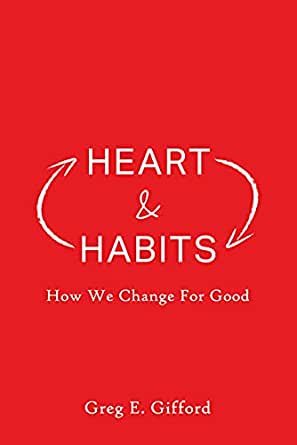
Content Summary
The habits we cultivate have a profound impact on our daily life. In fact, some have estimated that our habits comprise over 70% of all that we do daily. In his book Heart & Habits, Greg Gifford demonstrates how habits are instrumental in shaping our desires, our character, and how we function daily. He defines habits as “a usual or customary manner of behavior.” Gifford explains the direct connection between the heart and habit formation, which helps the reader to see that the reason why you develop habits is more important than the development of the habit itself.
Our habits have an inward, outward, and upward effect on our lives. Habits have a direct, inward impact on our lives through shaping our desires and developing character. Gifford depicts the outward impact of habits through a framework of five spheres of life – spiritual, personal familial, vocational, and social. The spiritual sphere includes both why we do what we do but also the way in which we do it. The personal sphere is the way in which we relate to ourselves, such as physical exercise or entertainment. The way in which we relate to or prioritize our family would fall within the family sphere. Habits pertaining to your career would encompass the vocational sphere and the social sphere would include habits related to social relationships.
Gifford explains that the purpose of habits for the Christian isn’t to make life more efficient or productive, but first to glorify God and second to do good to others. Efficiency and productivity may be a by-product of our habits, but that must not be the ultimate goal. In fact, at times, we may need to do things less efficient to glorify God. Gifford explains that the development of godly habits requires the work of the Holy Spirit as well as significant effort on our part.
 The development of habits is both intentional and unintentional. Bad habits are not always developed intentionally but good habits almost always are. Both the heart and body play an integral role in habit development. To develop new habits, Gifford stresses the importance of frequency of practice over length of time. According to Gifford, frequency of practice is what helps us measure our success. To focus on a set length of time is not helpful or accurate. Gifford also emphasizes the benefit of a slow, steady, regular approach over a frenzied, unrealistic, and unsustainable approach to habit formation. Community also plays a significant role in forming habits. Gifford also notes that habits we form in private can still form, but habits formed in community form more quickly and consistently. Our environment, or what we surround ourselves with, can help or hinder habit development. When we are around people who read their bibles regularly then we are more encouraged to do the same thing.
The development of habits is both intentional and unintentional. Bad habits are not always developed intentionally but good habits almost always are. Both the heart and body play an integral role in habit development. To develop new habits, Gifford stresses the importance of frequency of practice over length of time. According to Gifford, frequency of practice is what helps us measure our success. To focus on a set length of time is not helpful or accurate. Gifford also emphasizes the benefit of a slow, steady, regular approach over a frenzied, unrealistic, and unsustainable approach to habit formation. Community also plays a significant role in forming habits. Gifford also notes that habits we form in private can still form, but habits formed in community form more quickly and consistently. Our environment, or what we surround ourselves with, can help or hinder habit development. When we are around people who read their bibles regularly then we are more encouraged to do the same thing.
While the heart is at the center of everything we do, and the heart permeates every sphere of our lives, some spheres are more important than others and thus there is a priority to habit development. First and foremost, God has created us as spiritual beings to relate to him, therefore the spiritual sphere has first priority. Gifford discusses the biblical basis for each sphere and how they relate to priorities in our lives. When our desire is to please God, that propels us into other spheres of life to develop good habits and conversely our good habits help our hearts want to please God more.
After understanding proper habit prioritization, Gifford provides helpful information on types of habits that should be developed for each sphere. He suggests working on several habits at one time rather than just one. This provides the benefit of working on both a high priority habit as well as an urgent habit that may be a lesser priority. It is essential to evaluate the habits in our lives and Gifford provides an inventory to aid in this process. It includes unhelpful habits, sanctifying habits, and helpful habits for each sphere of life.
Gifford concludes Heart & Habits with a personal growth worksheet to help the reader evaluate their own habits and apply the principles contained in the book.
Primary Area of Usefulness
Heart & Habits is a very easy to read and intensely practical book. The counselor will benefit from this book by having a greater understanding of the motivation behind habits, the goal of habits, a systematic approach to evaluating habits, and practical help for developing new habits. The included diagrams and worksheets are very helpful when teaching the material to a counselee. The book is also very useful for any Christian reader who desires to develop God-honoring habits in their life.
Examples of Usefulness
Some practical ways to use this book could start with helping a counselees seek a greater understanding of their heart as it pertains to their life. Are they motivated by pleasing God? They must keep in mind that the primary goal of their habits should be to glorify God. How are they prioritizing the spheres of life? Then help them identify key habits they need to develop and use the worksheets provided in the book to develop a plan, stressing faithfulness, not perfection. Finally, help them set a regular time and process to evaluate habits in their life.
 Biblical Counseling
Biblical Counseling